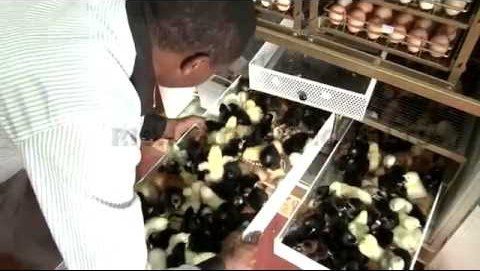In 2008, Wilson Mwangi saw a business opportunity in chicken hatching. Although he was still a Secondary student student, Mwangi decided to venture into the hatching and selling of chicks business. He had his business plan well laid out. He would construct a wooden incubator, buys some eggs, hatch and starting selling off day-old chicks at Sh. 100. “I made my first wooden incubator and set off on my poultry journey,” he says. However, Mwangi would soon realize that he had set out on the wrong foot.
Watch Chicksway Poultry Kenya’s video here
“It quickly dawned on me that my incubator wasn’t as efficient in hatching as I’d have thought it would be,” he says. “It had a low 50 to 60 per cent efficiency capacity.” At this point, the odds began to align against Mwangi’s venture. But rather than fold his chicken business, Mwangi decide to give it a fresh start.
In 2013, after completing his college studies, Mwangi got a Sh. 25,000 loan from his mother and brother. He then went to Nyamakima in Nairobi’s busy downtown, in search for cheap second hand electronics to set up a new incubator. “I bought a radiator, thermostat and microwaves, which I used to construct my new machine,” he says. “I was certain that there was a huge demand for kienyeji kukus and I would tap on it for profits. I only needed to make a solid start.” He named his chicken business Chicksway Poultry Kenya. “I thought of a name that would grow together with my business. Since then, my business target has always been to expand within the East African region.”
With his new machine, Mwangi improved his hatching from 1,000 chicks to about 5,000 chicks per week. However, his aim was much higher. “I was determined to hit 10,000 chicks per week,” he says. Within a few months, he made his first profit of Sh. 30,000. Since then, Mwangi has not looked back. Today, Chicksway Poultry Kenya boasts of a vast understanding of white and black dominant used in breeding of kienyeji chickens.”I now specialize in the hatchery of KARI improved kienyeji chicks,” he notes.
In the same vein, he recently imported an incubator from Spain which hatches at least 10,000 chicks every month. “The incubator was worth Sh. 1 million,” he says.
Based in Ruiru town in Kiambu County, Chicksway Poultry Kenya sells a day old chick at Sh. 100. “The chicks are first vaccinated from deadly chicken diseases. In the same vein, we also remove the weak chicks in our broods for sale to prevent them from going into the market,” says Mwangi. He adds that before selling his chicks, he ensures that they are well vaccinated to prevent them from contracting chicken diseases before maturity once they change hands to his customers. “I also ensure that after hatching, I have separated weak-looking chicks from the healthy ones. I don’t sell weak chicks.”
Mwangi observes that within five to six months, his kienyeji kukus will start laying. “My hens are able to attain over 1.2 kilograms upon maturity and lay 220 to 280 eggs per year while my cocks can hit 2.1 kilograms within five months,” he says. How does he ensure maximum production from his hatchery? Mwangi reveals his technique: “After four days, I scan all my eggs to ensure that only eggs that will hatch remain in the hatchery. He notes that oversize, hard or irregular eggs hardly hatch.” His chicks sell at Sh. 100 per chick.
Chicksway Poultry Kenya can be reached through: 0708 216 295.









